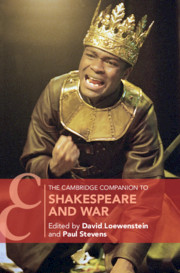Book contents
- The Cambridge Companion to Shakespeare and War
- The Cambridge Companion to Shakespeare and War
- Copyright page
- Dedication
- Contents
- Figures
- Contributors
- Preface
- Acknowledgments
- 1 Beyond Shallow and Silence
- 2 Just War Theory and Shakespeare
- 3 Shakespeare on Civil and Dynastic Wars
- 4 Foreign War
- 5 War and the Classical World
- 6 “The Question of These Wars”
- 7 Instrumentalizing Anger
- 8 War and Eros
- 9 Shakespeare’s Language and the Rhetoric of War
- 10 Staging Shakespeare’s Wars in the Twentieth and Twenty-First Centuries
- 11 Reading Shakespeare’s Wars on Film
- 12 Shakespeare and World War II
- 13 Henry V and the Pleasures of War
- 14 Macbeth and Trauma
- 15 Coriolanus and the Use of Power
- Index
- References
12 - Shakespeare and World War II
Published online by Cambridge University Press: 17 August 2021
- The Cambridge Companion to Shakespeare and War
- The Cambridge Companion to Shakespeare and War
- Copyright page
- Dedication
- Contents
- Figures
- Contributors
- Preface
- Acknowledgments
- 1 Beyond Shallow and Silence
- 2 Just War Theory and Shakespeare
- 3 Shakespeare on Civil and Dynastic Wars
- 4 Foreign War
- 5 War and the Classical World
- 6 “The Question of These Wars”
- 7 Instrumentalizing Anger
- 8 War and Eros
- 9 Shakespeare’s Language and the Rhetoric of War
- 10 Staging Shakespeare’s Wars in the Twentieth and Twenty-First Centuries
- 11 Reading Shakespeare’s Wars on Film
- 12 Shakespeare and World War II
- 13 Henry V and the Pleasures of War
- 14 Macbeth and Trauma
- 15 Coriolanus and the Use of Power
- Index
- References
Summary
This chapter argues that, while Shakespeare was deployed in World War II Britain for propaganda purposes, references to the playwright or his works also exposed rifts or contradictions within the national culture he was called upon to embody. It focuses on three major media in which Shakespeare was performed, adapted, or appropriated: the theater, the radio, and the cinema. Whereas state intervention fostered the performance of Shakespearean drama throughout the nation, the BBC underwent dramatic changes that meant that, while Britain’s national poet remained central to its mission, he was also associated with an elitist model of broadcasting whose hegemony was overturned during the war years. As for film, wartime Shakespearean appropriations show that the playwright could trouble propaganda imperatives as well as support them. In sum, while Shakespeare was a cornerstone of British wartime nationalism, he additionally served as a register of cultural, regional, and social difference.
- Type
- Chapter
- Information
- The Cambridge Companion to Shakespeare and War , pp. 205 - 220Publisher: Cambridge University PressPrint publication year: 2021

